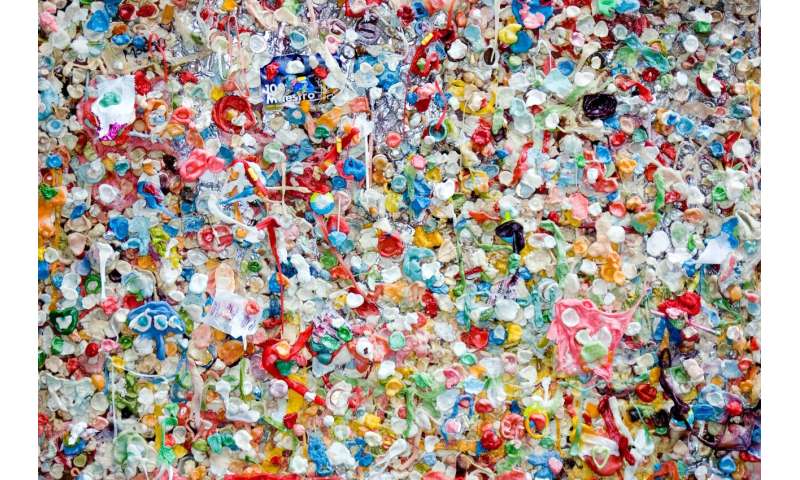#New platform gauges effects of plastic nanoparticles on human development and health
“#New platform gauges effects of plastic nanoparticles on human development and health”

Plastic pollution is a critical environmental issue facing the world today, yet the impact of all the microplastics (MPs) and nanoplastics (NPs) that have seeped into the food and beverage supply on human health is an “undervalued avenue of research,” according to the team behind a revealing new study released today in Stem Cells. This study outlines the new platform researchers designed that allowed them to investigate the potentially harmful effects of MPs and NPs. The results show not only how these particles can impact a developing infant’s health, but also may open novel ways to study this prevalent type of pollution and its contributions to the origin of various diseases.
From 1950 to now, plastic production has increased nearly 200-fold to the current 350 million tons, according to a study published last June in Science of The Total Environment. As of 2018, approximately 6.9 billion tons had become waste, with 79 percent of that accumulated in the natural environment.
“Assuming that only 15 percent of their total caloric intake is from plastic-packaged nutrients, it was calculated that the average person consumes up to 121,000 MP particles per year, while people who drink bottled water consume an additional 90,000 MP. And these numbers don’t account for particulates that enter our bodies through occupational exposure (such as construction, boating or the bath and shower industries) and other means. So you can see this number has the potential to increase substantially,” said Miodrag Stojkovic, Ph.D., DVM. Dr. Stojkovic is corresponding author of the international study, led by researchers from the Medical Fertility Hospital, Leskovac, Serbia, and Faculty of Medical Sciences, University of Kragujevac, Serbia, and currently is affiliated with Massachusetts Eye and Ear, Harvard Medical School in Boston.
Few studies have investigated the potentially harmful effects of MPs/NPs on early human development and health. To further complicate things, the plethora of plastic types, particle sizes and the lack of a reliable model makes studying the impact of rising environmental plastic pollution on human health a real challenge.
“Adding to that,” Dr. Stojkovic said, “no clear definition or regulation of MPs/NPs exists on an international basis.”
All this led Dr. Stojkovic and his colleagues to develop a new platform that would enable them, for the first time, to estimate gene changes and signaling pathways that might be altered in response to the exposure of pre-implantation human embryos and human induced pluripotent stem cells (iPSCs) to plastic particles. They focused their work on nanoparticles shed by one of the most prevalent types of plastics used in food and beverage packaging—polystyrene.
To begin, they analyzed human iPSC growth media that was persistently exposed to plastic (storage bottles, dishes, pipettes and tips, laboratory air and lab coats) using pyrolysis-gas chromatography/mass spectrometry (PyGC/MS). The PyGC/MS analysis excluded the additional presence of any known polymer. Next, they exposed thawed early human expanded blastocysts and human iPSCs to nano- (40 nm) and micro- (200 nm) polystyrene items and examined the effects. And lastly, the researchers used the HiPathia method—a model that allows the estimation of how changes in the expression of genes affect signaling circuits and consequent cell functional decisions—to enable them to detect any disease mechanisms and predict relevant clinical outcomes.
The collective data from these analyses showed that NPs alter genes that are connected to eye development, cardiac malformations and ischemia.
“Taken together, results obtained with our embryo- and stem cell-based platform and polystyrene NPs clearly demonstrate that an understanding of bio-NP interactions and the implications on human health is, more than ever, of utmost importance, especially in this era of increased environmental plastic pollution and the presence of microscopic plastic particles in the air, soil, food, beverages, and tap water,” Dr. Stojkovic said. “We also believe that the study findings make a strong call for an urgent action by scientific and policymaking authorities to create regulatory measures that might lessen NPs’ impact, especially given that our platform deciphers the links between environmental and intracellular pollutions, and origin of detrimental diseases.”
“This outstanding report provides a sobering look at the effects of plastic nanoparticles on human stem cells. It has been known that these particles are problematic, but this is the first report, to my knowledge, to provide mechanistic, detailed data on how polystyrene nanoplastics affect human iPSCs and embryonic cells,” said Jan Nolta, Editor-in-Chief of Stem Cells. “This platform will be very useful for future studies evaluating the negative effects of different types of plastic nanoparticle contaminants.”
More information:
Sanja Bojic et al, Platform to study intracellular polystyrene nanoplastic pollution and clinical outcomes, STEM CELLS (2020). DOI: 10.1002/stem.3244
Provided by
AlphaMed Press
New platform gauges effects of plastic nanoparticles on human development and health (2020, July 2)
retrieved 2 July 2020
from https://phys.org/news/2020-07-platform-gauges-effects-plastic-nanoparticles.html
This document is subject to copyright. Apart from any fair dealing for the purpose of private study or research, no
part may be reproduced without the written permission. The content is provided for information purposes only.
If you want to read more Like this articles, you can visit our Science category.
if you want to watch Movies or Tv Shows go to Dizi.BuradaBiliyorum.Com for forums sites go to Forum.BuradaBiliyorum.Com




